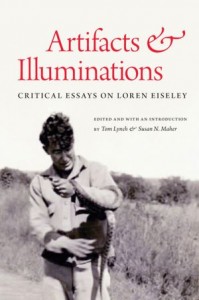In the spring of 2012, my essay “Unearthing Urban Nature,” an analysis of scientist-writer Loren Eiseley’s investigations and representations of urban and suburban landscapes, was published in the critical anthology Artifacts and Illuminations: Critical Essays on Loren Eiseley, edited by Tom Lynch and Susan Maher (University of Nebraska Press).
 I just received word that the collection has won the Nebraska Book Award for best anthology in 2012, which is a testament to the hard work of the book’s editors as well as the high production quality by UNP. You can read the book’s Table of Contents and Editors’ Introduction (pdf), a pre-publication pdf of my chapter, as well as reviews in Western American Literature (Andrew Angyal, 2013) and Prairie Fire (Christine Pappas, 2013).
I just received word that the collection has won the Nebraska Book Award for best anthology in 2012, which is a testament to the hard work of the book’s editors as well as the high production quality by UNP. You can read the book’s Table of Contents and Editors’ Introduction (pdf), a pre-publication pdf of my chapter, as well as reviews in Western American Literature (Andrew Angyal, 2013) and Prairie Fire (Christine Pappas, 2013).
About Artifacts & Illuminations
Loren Eiseley (1907–77) is one of the most important American nature writers of the twentieth century and an admired practitioner of creative nonfiction. A native of Lincoln, Nebraska, Eiseley was a professor of anthropology and a prolific writer and poet who worked to bring an understanding of science to the general public, incorporating religion, philosophy, and science into his explorations of the human mind and the passage of time.
As a writer who bridged the sciences and the humanities, Eiseley is a challenge for scholars locked into rigid disciplinary boundaries. Artifacts and Illuminations, the first full-length collection of critical essays on the writing of Eiseley, situates his work in the genres of creative nonfiction and nature writing. The contributing scholars apply a variety of critical approaches, including ecocriticism and place-oriented studies ranging across prairie, urban, and international contexts. Contributors explore such diverse topics as Eiseley’s use of anthropomorphism and Jungian concepts and examine how his work was informed by synecdoche. Long overdue, this collection demonstrates Eiseley’s continuing relevance as both a skilled literary craftsman and a profound thinker about the human place in the natural world. (from the book’s website)